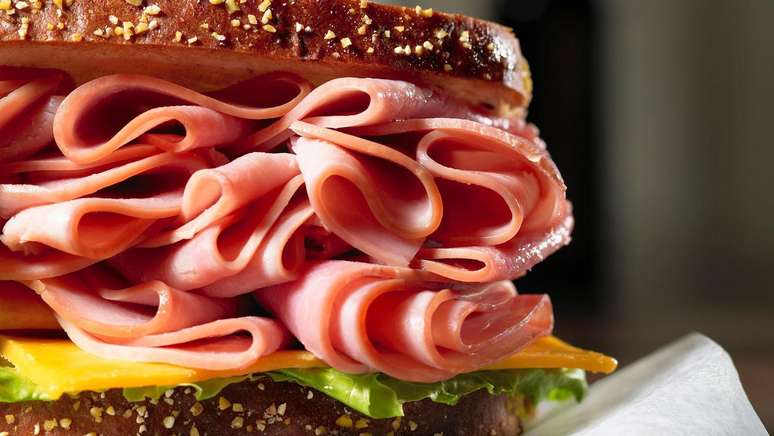According to experts, the results of the study, conducted on nearly 2 million people, should not cause panic.
Headlines warn that eating “a ham sandwich a day” increases the risk of type 2 diabetes, but experts say it’s not that simple.
A study of nearly 2 million people from 20 different countries found a link between the disease and red and processed meats, such as steak, bacon and sausages.
While the research was well done, the results are nuanced and should not cause fear or panic.
It makes sense to limit intake in line with healthy eating guidelines, they say, but the study findings shouldn’t lead people to eliminate meat from their menus.
The relationship is not a proof
The research, published in the academic journal The Lancet Diabetes and EndocrinologyIt has one inevitable limitation: it cannot prove that meat causes diabetes, because it is impossible to completely exclude all other possible risk factors, such as other foods consumed by the people who participated in the study and their lifestyle.
“The authors attempted to control for other risk factors associated with an increased risk of developing type 2 diabetes, including higher body weight, smoking, alcohol consumption and low vegetable intake,” said Duane Mellor, of the British Dietitians Association (BDA).
There was some missing data on the effects of family history and waist circumference, which may be associated with diabetes, but the researchers say they are confident in the relationship they found.
Furthermore, studies like this one rely on participants telling the truth and accurately remembering what they ate.
Does this mean the results should be discarded entirely?
No, not at all. The study contributes to a general vision of which foods – and in what quantities – can be good or bad for us.
“This is an important study that, despite the inevitable observational nature of the trials, is very well done,” said Naveed Sattar, a professor at the University of Glasgow, Scotland, who specializes in cardiometabolic medicine.
“The data suggest that eliminating red and processed meat from the diet could not only protect people from heart disease and stroke, but also from type 2 diabetes, a disease on the rise worldwide.”
bowel cancer
In the study, consuming two thick slices of ham (50 g) or one small steak (100 g) per day appeared to be risky.
The findings for chicken and other white meats were less clear.
The NHS already advises people who eat more than 90g (after cooking weight) of red or processed meat a day to cut back to 70g, because experts believe that consuming too much processed meat can cause bowel cancer.
The International Agency for Research on Cancer places it in the same risk category as smoking and asbestos.
Processed meat has been modified to add flavor or extend its shelf life.
The chemicals and methods used, such as smoking, curing, or adding salt or preservatives, can be a factor.
And while meat is a good source of protein, vitamins and minerals, it can also sometimes contain a lot of saturated fat, which has been linked to high blood cholesterol levels, a risk factor for heart disease.
Blood sugar levels
“Our research provides the most comprehensive evidence to date of an association between consumption of processed meat and unprocessed red meat and an increased risk of future type 2 diabetes,” said study lead researcher Nita Forouhi, a professor at the University of Cambridge in England.
“Strengthens recommendations to limit consumption of processed meat and unprocessed red meat to reduce cases of type 2 diabetes in the population.”
Type 2 diabetes is high blood sugar levels due to the body not producing enough of a hormone called insulin or the insulin it produces not working properly.
Risk factors include:
- Obesity or overweight;
- High blood pressure;
- Ethnicity;
- Family history.
Duane Mellor warns that people who are thinking about cutting back on meat should make sure they continue to eat enough vital nutrients like iron and vitamin B12.
“It is important when considering reducing or eliminating a food type from the diet that any replacement foods provide the same nutrients to maintain an overall healthy diet,” she explains.
Good sources of vitamin B12 include:
- Milk;
- Cheese;
- Egg;
- Fortified Yeast Extract;
- fortified breakfast cereals;
- Fortified soy products.
Source: Terra
Rose James is a Gossipify movie and series reviewer known for her in-depth analysis and unique perspective on the latest releases. With a background in film studies, she provides engaging and informative reviews, and keeps readers up to date with industry trends and emerging talents.


![A Better Life Preview: What’s in store for Wednesday, October 22, 2025 Episode 447 [SPOILERS] A Better Life Preview: What’s in store for Wednesday, October 22, 2025 Episode 447 [SPOILERS]](https://fr.web.img5.acsta.net/img/f8/43/f843493759d61370dcef713a987b0620.jpg)
-1ji50mecs3jg9.jpg)



